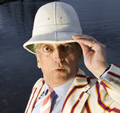 Twenty years ago I’d have crossed the street to avoid meeting John Selwyn Gummer, then agriculture minister in Margaret Thatcher’s government, chiefly famous for having attempted to feed his young daughter a beefburger at the 1990 Ipswich Boat Show to demonstrate his understanding of the risks of contracting bovine spongiform encephalopathy (aka mad cow disease) from contaminated meat. It has since killed 166 people in Britain, Cordelia Gummer not among them. I now find myself in the strange position of agreeing rather wholeheartedly with Baron Deben, as he is currently styled, in an article headlined Climate change doubters are endangering our common future published in The Australian (!) last week. And his musings on the politics of climate action provide a useful counterpoint to the astonishing submission on the NZ government’s intention to gazette a “50 by 50” target for carbon emissions made earlier this month by an Australian organisation calling itself The Carbon Sense Coalition.
Twenty years ago I’d have crossed the street to avoid meeting John Selwyn Gummer, then agriculture minister in Margaret Thatcher’s government, chiefly famous for having attempted to feed his young daughter a beefburger at the 1990 Ipswich Boat Show to demonstrate his understanding of the risks of contracting bovine spongiform encephalopathy (aka mad cow disease) from contaminated meat. It has since killed 166 people in Britain, Cordelia Gummer not among them. I now find myself in the strange position of agreeing rather wholeheartedly with Baron Deben, as he is currently styled, in an article headlined Climate change doubters are endangering our common future published in The Australian (!) last week. And his musings on the politics of climate action provide a useful counterpoint to the astonishing submission on the NZ government’s intention to gazette a “50 by 50” target for carbon emissions made earlier this month by an Australian organisation calling itself The Carbon Sense Coalition.
Tag: Nigel Lawson
NIWA v Cranks 4: Shoot out at the fantasy factory
 Earlier today a Hot Topic reader drew my attention to this article: Legal Defeat For Global Warming In Kiwigate Scandal, which Nigella Lawson’s father’s secretly-funded Global Warming Policy Foundation chose to feature on its web site. What’s “Kiwigate”, he wanted to know?
Earlier today a Hot Topic reader drew my attention to this article: Legal Defeat For Global Warming In Kiwigate Scandal, which Nigella Lawson’s father’s secretly-funded Global Warming Policy Foundation chose to feature on its web site. What’s “Kiwigate”, he wanted to know?
Turns out it’s the NIWA versus NZ Climate “Science” Education Trust court case, launched back in August. It also turns out that the article in question is wrong in just about every material respect, and possibly libellous to boot. And the source for this farrago? A post by Richard Treadgold at his Climate Conversation blog, where he claims (in characteristically long-winded fashion) that in NIWA’s “statement of defence” (the document supplied to the High Court as a response to the NZ CSET’s “statement of claim“) NIWA “formally denies all responsibility for the national temperature record (NZTR)“. Well, not quite. Let’s look first at the “Kiwigate” piece…
Continue reading “NIWA v Cranks 4: Shoot out at the fantasy factory”
Monckton is a fraud
 Christopher, Viscount Monckton of Brenchley, pompous peer of a parish in Kent, not content with threatening legal action against US scientist John Abraham (who had the temerity to point out the huge number of errors and misrepresentations in a talk he gave: see Support John Abraham, now 1050+ comments), has now threatened action for libel against Professor Scott Mandia. Mandia wrote a blog post in support of Abraham, inviting members of the media to consider if Monckton were a fraud — which drew a spiteful little email from Tannochbrae…
Christopher, Viscount Monckton of Brenchley, pompous peer of a parish in Kent, not content with threatening legal action against US scientist John Abraham (who had the temerity to point out the huge number of errors and misrepresentations in a talk he gave: see Support John Abraham, now 1050+ comments), has now threatened action for libel against Professor Scott Mandia. Mandia wrote a blog post in support of Abraham, inviting members of the media to consider if Monckton were a fraud — which drew a spiteful little email from Tannochbrae…
I also note that you have publicly accused me of “fraudâ€, and have widely circulated that accusation on the internet, and have expressed the intention to invite the mass media to repeat it. Since this is a serious charge, do you have any evidence to back it up, or should I add your name to that of Professor Abraham in the libel case that will be filed shortly?
Mandia’s open letter to the media asked them to “expose Monckton for the fraud that he is”, which is somewhat different to an accusation of fraudulent behaviour. Let’s examine the evidence, and see if Monckton can reasonably be described as “a fraud”, and whether his actions and public statements are in themselves fraudulent. First we need some definitions:
CRU’s Jones on the stand: Pearce offers opinion as news
 Fred Pearce is obviously unrepentant over the unjust treatment he meted out to Phil Jones in his unfortunate series of artices on the UEA emails, one of which I commented on here. He has just produced an extraordinarily slanted accountof Jones’ questioning from the Parliamentary committee set up to look into the affair. How’s this for openers?
Fred Pearce is obviously unrepentant over the unjust treatment he meted out to Phil Jones in his unfortunate series of artices on the UEA emails, one of which I commented on here. He has just produced an extraordinarily slanted accountof Jones’ questioning from the Parliamentary committee set up to look into the affair. How’s this for openers?
“Jones did his best to persuade the Commons science and technology committee that all was well in the house of climate science. If they didn’t quite believe him, they didn’t have the heart to press the point. The man has had three months of hell, after all.”
Then Pearce offers two highly prejudicial descriptions of Jones’ actions, each linked to one of his own articles:
“Jones’s general defence was that anything people didn’t like – the strong-arm tactics to silence critics, the cold-shouldering of freedom of information requests, the economy with data sharing – were all “standard practice” among climate scientists.”
Pearce expresses disappointment that one of his own pet projects was not pursued by the committee:
“Nobody asked if, as claimed by British climate sceptic Doug Keenan, he had for two decades suppressed evidence of the unreliability of key temperature data from China.”
Gavin Schmidt has comprehensively dealt with this claim on Real Climate (see his comments on part 5). If Pearce is aware of what Schmidt wrote he is undeterred by it and again links to his own article as demonstrating the topic worthy of the attention of a parliamentary committee.
Then Pearce apparently leaves the scene of the parliamentary committee and offers his own account of what he claims Jones has conceded publicly about the 1990 China study, translating Jones’ ‘slightly different conclusion’ into his own ‘radically different findings’.
There are other important Pearce conclusions which the committee failed to investigate, again expressed in prejudicial terms:
“Nor did the MPs probe how conflicts of interest have become routine in Jones’s world of analysing and reconstructing past temperatures. How, as the emails reveal, Jones found himself intemperately reviewing papers that sought to criticise his own work. And then, should the papers somehow get into print, judging what place they should have in the reports of the Intergovernmental Panel on Climate Change (IPCC), where he and his fellow emails held senior positions.”
Pearce takes comfort from his feeling that the committee will have to pay closer attention to the issue in the light of the written submission from the Institute of Physics which is highly critical of the emailers. He doesn’t mention that John Beddington, the government’s chief scientific adviser, told the committee the institute’s view was “premature” and that they should wait until the Russell inquiry publishes its findings in the spring.
Pearce’s Guardian report is clearly an opinion piece but not presented as such. It is an extraordinary example of the authority some journalists have taken upon themselves to declare judgment on matters of which they have shown very little knowledge. Pearce is not a climate change sceptic, but he is hounding a group of climate scientists and seems fired up by the thrill of the chase. It’s a sad spectacle in a leading newspaper.
[GR adds: The Guardian’s David Adam provides a more balanced overview here, and the paper’s live blog of the session is worth a look.]
[GR update: Simon Hoggart’s take: “Whatever your view on man-made global warming, you had to feel sorry for Professor Phil Jones..”]
You can’t Hide (your policy from me)
 A few months ago, Rodney Hide decided that he and his party had little to lose and votes to gain by declaring themselves to be climate sceptics. I’ve roundly criticised this stance in earlier posts, and this week I’ve been joined by The Listener‘s Ecologic columnist Sarah Barnett, who takes Hide to task here (full text available next week). With the election approaching, it’s time to dig a little deeper into the intellectual foundations of ACT’s climate change policy, such as they are.
A few months ago, Rodney Hide decided that he and his party had little to lose and votes to gain by declaring themselves to be climate sceptics. I’ve roundly criticised this stance in earlier posts, and this week I’ve been joined by The Listener‘s Ecologic columnist Sarah Barnett, who takes Hide to task here (full text available next week). With the election approaching, it’s time to dig a little deeper into the intellectual foundations of ACT’s climate change policy, such as they are.
The ACT web site now features a policy document [PDF], and a background briefing [PDF] on their policies page. Let’s take a detailed look…
